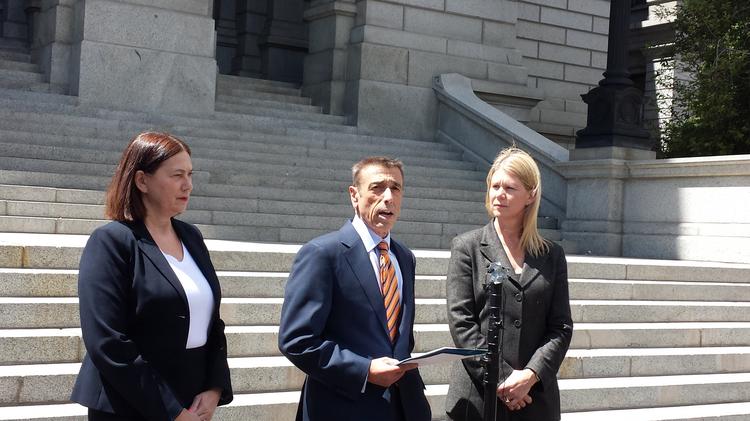Colorado Senate Republican leaders said Monday they are close to agreeing to a deal that would save more than half-a-billion dollars in proposed funding cuts for statewide hospitals.
The deal would also offer up a $37 million business personal-property tax cut and clear space in future budgets for transportation and education funding hikes.
The deal on Senate Bill 267 was so close, in fact, that co-sponsoring Sen. Jerry Sonnenberg, R-Sterling, had passed out a bullet-point sheet describing the details of the deal and had begun to inform a media briefing about the plan Monday morning when he received a note from co-sponsoring Senate Minority Leader Lucia Guzman telling him that the Denver Democrat was pulling back from what he’d described as a “handshake agreement.”
Surprised, Sonnenberg said he would sit down again with Guzman and with the bipartisan House sponsors of SB 67 and hoped to come up with a deal in the next week.
The biggest sticking point between Republicans and Democrats remains Republicans’ insistence on including efforts to slow the growth of Medicaid costs that include an increase on co-pays by Medicaid recipients.
The issue first surfaced when House Republicans tried to increase co-pays during the budget debate and put the savings for the state to transportation funding — an effort blocked by Democrats who insisted the budget would not be balanced on the backs of the poorest and sickest state residents.
The bill, put forth as a way to forgo a proposed $528 million in funding cuts via the hospital-provider fee, has always been a complex piece of legislation that also seeks to increase funding for rural roads and schools and to cut state funding across the board in order to help for that re-prioritizing.
But it took on an even greater diversity of topics over the past week, when Sonnenberg added a long-sought business personal property tax cut to offset what he called his concessions on lowering the Taxpayer’s Bill of Rights cap in order to offset the money being taken out for the hospital provider fee.
Under the latest proposal, all businesses could take a tax credit on the local personal-property taxes they pay on the first $25,000 worth of their equipment. Currently, any business owning $7,300 worth of business personal property or less is exempt from paying the tax, meaning that only small businesses with minimal equipment get a break on what business leaders have said is a tax that hurts their ability to recruit capital-heavy companies.
“This is an incredible help to our small businesses,” Sonnenberg said of the new provision.
At the heart of SB 267 is an agreement to pull the hospital provider fee out from under the TABOR revenue cap and turn the fee into an enterprise fund, reducing the cap by about $200 million in doing so.
Republicans have fought the enterprising of the per-bed nightly fee on hospitals, whose revenue is matched dollar for dollar with federal funds to increase Medicaid eligibility for adults without dependents, because they’ve believed the cap should go down at the same rate as the dollars being pulled out of it, but Sonnenberg said that protracted negotiations this year have produced a willingness to bring down the cap only partially in exchange for concessions, especially as several rural hospitals have said they are in danger of closing if they lose as much as expected in the hospital-provider-fee cut.
In addition, what Sonnenberg and Guzman call the “Sustainability of Rural Colorado” bill would set aside $150 million that could be used to repay a $1.8 bond issue and use that money for improving state highways, with at least 25 percent of the proceeds going to roads in counties with populations of 50,000 people or less. That’s far less than the $3.5 billion bond issue contemplated in a recently killed bill that proposed a sales-tax hike, but all of the funding in SB 267 would come from existing sources — $100 million from the general fund and $50 million from the Highway Users Trust Fund that is funded largely by gas-tax revenues.
SB 267 also would seek to slow the growing spending on Medicaid by requiring an increased co-pay by Medicaid patients on doctors’ visits and by reducing the administrative fee paid to the Colorado Department of Health Care Policy and Financing. It also requires the implementation of several other programs designed to make more efficient use of Medicaid funds.
Finally, the bill would require each department, except for education and transportation, to propose ways to trim their budgets by 2 percent next year as a way of helping to pay for the transportation bonds.
As Republican and Democratic leaders huddled in negotiations throughout the day, hospital leaders held a news conference on the east steps of the Capitol imploring the two sides to come to an agreement.
As many as a half-dozen rural hospitals could close if the $528 million cut on the provider fee stays in next year’s proposed budget, Colorado Hospital Association president and CEO Steven Summer said. And urban hospitals like Denver Health and Children’s Hospital Colorado would have to cut services ranging from telemedicine to behavioral-health care if their facilities were to loose tens of millions of dollars.
Summer said those kinds of impacts would be far more significant on the health of Colorado residents than it would to have Medicaid recipients have to pay a little bit more for primary-care or prescription services.
“We’re certainly sensitive to the impact of co-pays, but we’re looking to the Legislature to do what they need to do to pass Senate Bill 267,” Summer said. “And we’re looking to them to put together the kind of deal that will pass.”
Ed Sealover covers government, health care, tourism, airlines, hospitality, restaurants and brewing for the Denver Business Journal. Phone: 303-803-9229.

Leave a Reply